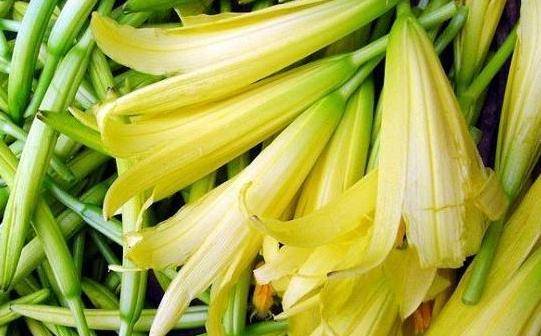Yellow flower vegetables, modern evaluation of it is relatively “negative”, as in “the yellow flower vegetables have all cooled down,” expressing heartache and helplessness. Some news reports mention poisoning from mistakenly eating fresh yellow flower vegetables, while others reveal that excessive industrial materials are used in processing yellow flower vegetables, unfairly tarnishing its reputation.
In reality, there is no harmful yellow flower vegetable, rather it is those who don’t know how to eat, utilize, and have twisted minds that are at fault. The true effects of yellow flower vegetables should be considered as “respecting the elderly vegetable,” “versatile vegetable,” “rare delicacy vegetable,” “auspicious vegetable,” and a “meritorious vegetable.”
1. Calms and aids sleep
Eating yellow flower vegetables in moderation can help improve sleep quality. These vegetables contain various substances such as common vitamins, minerals, and amino acids, which can have a calming effect when consumed.
For those who often suffer from insomnia, consuming yellow flower vegetables for the nutrients can significantly improve sleep quality and mental well-being.
2. Reducing liver heat
Regularly consuming yellow flower vegetables can help reduce liver heat. People with excess liver heat can benefit from a diet rich in yellow flower vegetables. For example, women experiencing menopausal symptoms such as dry mouth, facial flushing, irritability, and restlessness due to liver heat can find stability by including yellow flower vegetables in their diet.
In Traditional Chinese Medicine, excessive liver energy in children, characterized by irritability, disobedience, and easy anger, can also be managed by including yellow flower vegetables in their diet to reduce liver heat.
3. Promotes brain health and cognition
Yellow flower vegetables are rich in lecithin, a crucial substance for brain cell composition that enhances brain function and helps clear arterial deposits. These benefits of lecithin supplementation can improve concentration, memory, and are particularly beneficial for the elderly and children.
4. Supports digestion and stomach health
The stomach processes the food we eat, converting it into essential elements the body needs through digestion and transportation. Healthy stomach and spleen function are essential for overall physical health.
Unhealthy dietary habits can harm the stomach and spleen, leading to symptoms like poor appetite, abdominal fullness, and indigestion. Consuming yellow flower vegetables can support digestion and help restore stomach and spleen function.
5. Regulates blood lipids
Studies have shown that consuming yellow flower vegetables can significantly reduce serum cholesterol levels and provide effective lipid-lowering effects, making them suitable for individuals with high blood lipids, high blood sugar, obesity, and related conditions to include in their diet.
For individuals allergic to yellow flower vegetables, it is imperative to avoid consuming them or any dishes containing these vegetables. Symptoms of an allergic reaction typically include itchiness, rash, diarrhea, vomiting, dizziness, and in severe cases, anaphylactic shock, requiring immediate medical attention.
Therefore, individuals with allergies should refrain from eating yellow flower vegetables to prevent life-threatening consequences.
For individuals with weak spleen and stomach function, the cooling nature of yellow flower vegetables may exacerbate digestive discomfort and worsen gastrointestinal conditions. It is advised to consume yellow flower vegetables in moderation after evaluating one’s health status and regulating dietary intake to prevent adverse symptoms.
For individuals experiencing skin itching, consuming yellow flower vegetables is not recommended as the nutrients in these vegetables may worsen skin irritation. If skin irritation occurs during or after consuming yellow flower vegetables, it is advisable to discontinue consumption to avoid complications and aid in subsequent treatment.
Individuals with asthma should also avoid consuming yellow flower vegetables, as it can exacerbate asthma symptoms. Asthma patients should refrain from consuming damp and heat-inducing foods like yellow flower vegetables to prevent worsening of the condition and interference with treatment.
While fresh yellow flower vegetables contain a substance called “colchicine,” which is non-toxic in its original form, but upon absorption in the gastrointestinal tract, it transforms into “colchicine II,” which is highly toxic.
Hence, when consuming fresh produce, it is recommended to avoid overconsumption. The toxic components in fresh yellow flower vegetables can be weakened or eliminated at high temperatures of 60°C, therefore, before consuming fresh yellow flower vegetables, they should be blanched in boiling water first, soaked in clean water for more than 2 hours, rinsed thoroughly, and then cooked. This process helps neutralize the toxic colchicine, ensuring the safe consumption of fresh yellow flower vegetables.
When consuming dried yellow flower vegetables, it is best to soak them in clean or warm water multiple times before consumption to eliminate any residual harmful substances like sulfur dioxide.


